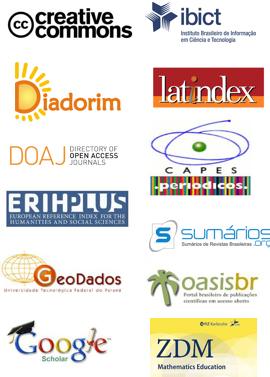A Teoria da Atividade e suas Contribuições ao Ensino e Aprendizagem da Matemática
DOI:
https://doi.org/10.17921/2176-5634.2024v17n2p171-176Resumo
O presente trabalho tem por objetivo apresentar algumas possíveis contribuições da Teoria da Atividade, conforme proposta por vários estudiosos, sobretudo pelo psicólogo e filósofo russo, Alexei Leontiev, no processo de ensino e aprendizagem da matemática, sem especificar níveis, etapas ou modalidades formais. Para isso, uma revisão bibliográfica abrangente foi realizada, utilizando textos científicos encontrados nas bases de produções científicas: Web of Science, Scopus e Banco Digital de Teses e Dissertações – BDTD. Os dados selecionados foram submetidos a critérios rigorosos e objetivos, visando evitar subjetividades na escolha e tratativa. Após análise, verificou-se que as apropriações da Teoria da Atividade no contexto do ensino de matemática apresentam razoáveis potencialidades. No entanto, devido à impossibilidade de se abordar todas as contribuições identificadas, o foco desta pesquisa recaiu sobre práticas problematizadoras que incorporam os pressupostos da citada teoria. Essas práticas foram consideradas essenciais por sua capacidade de promover uma compreensão mais profunda dos conceitos matemáticos, estimulando a participação ativa dos aprendentes em todo o processo de aprendizagem. Por fim, este trabalho destaca a relevância da Teoria da Atividade, na perspectiva de Leontiev como uma abordagem promissora para o ensino de matemática, oferecendo insights valiosos para docentes interessados em promover um ensino de matemática mais significativo e eficaz.
Palavras-chave: Teoria da Atividade. Ensino. Aprendizagem. Matemática.
Abstract
The present work aims to present some possible contributions of Activity Theory, as proposed by several scholars, especially by the Russian psychologist and philosopher, Alexei Leontiev, in the process of teaching and learning mathematics, without specifying levels, stages or formal modalities. To this end, a comprehensive bibliographic review was carried out, using scientific texts found in the databases of scientific productions: Web of Science, Scopus and Digital Bank of Theses and Dissertations – BDTD. The selected data were subjected to rigorous and objective criteria, aiming to avoid subjectivity in the choice and treatment. After analysis, it was found that the appropriations of Activity Theory in the context of mathematics teaching have reasonable potential. However, due to the impossibility of addressing all identified contributions, the focus of this research was on problematizing practices that incorporate the assumptions of the theory. These practices were considered essential due to their ability to promote a deeper understanding of mathematical concepts, encouraging the active participation of learners throughout the learning process. Finally, this work highlights the relevance of Activity Theory, from Leontiev's perspective, as a promising approach to teaching mathematics, offering valuable insights for teachers interested in promoting more meaningful and effective mathematics teaching.
Keywords: Activity Theory. Teaching. Learning. Mathematics.


